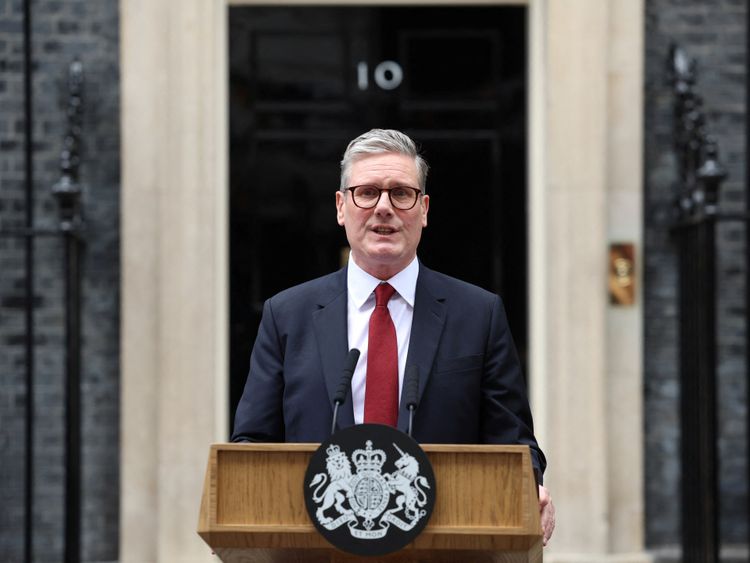Keir Starmer says scrapping UK’s Rwanda migrant deportation plan

The new British Prime Minister, Keir Starmer, announced that he will not be following the previous Conservative government's plan to send asylum seekers to Rwanda. This decision has been praised by human rights activists as something that should have happened much sooner.
Starmer expressed that the Rwanda plan was unsuccessful from the beginning and it did not stop anything. He made these comments during his initial press briefing following the Labour Party's significant victory in the recent election.
"I am not willing to keep using tricks that do not work to stop something,” he said to the media after a meeting with his advisors, calling the proposal a “challenge that we are receiving from previous administrations.”
The law was passed by Parliament in April, designating Rwanda as a safe third country. This decision disregarded a previous ruling by the UK Supreme Court, which had deemed the scheme as unlawful due to human rights concerns.
In May, the officials began holding asylum seekers in custody.
Former Prime Minister Rishi Sunak, who pledged to halt the influx of migrants and asylum seekers crossing the English Channel in small boats from Europe, was a strong advocate for the policy.
Human rights advocates and opponents of Sunak's administration strongly criticized the decision to send individuals to Rwanda instead of processing their asylum applications in the UK, deeming it cruel and unjust.
They expressed worries about the human rights situation in the East African nation and mentioned that asylum seekers could potentially be returned to unsafe countries.
However, despite facing resistance in parliament, Sunak confidently stated in April, "There will be no hesitation or objections. These flights will be going to Rwanda."
Thousands of people seeking asylum have made their way to Britain in the past few years. They come from countries in Africa, the Middle East, and Asia, escaping war and poverty. They have taken dangerous trips across the English Channel in small boats, with the help of criminal groups who smuggle them into the country.
In his Saturday press briefing, Starmer mentioned that the Rwanda program was anticipated to be unsuccessful.
"Everyone, especially the organized groups in charge, has realized that the likelihood of going to Rwanda was extremely low - less than 1 percent," he informed the media.
The odds were against leaving, getting approved, and therefore remaining in paid accommodations for an extended period.
Sonya Sceats, the leader of the organization Freedom from Torture, which supports individuals seeking safety in the United Kingdom, expressed her approval of Starmer's declaration.
"This is a huge win for advocates, for asylum seekers, for legal professionals, for the countless individuals throughout the nation who came together to oppose the highly unjust exchange of money for human lives," she shared with Al Jazeera during the weekend.
Earlier today, Agnes Callamard, the head of Amnesty International, urged the newly elected Labour government to fulfill their commitment made during the campaign to abolish the agreement with Rwanda.
In a recent post on social media, Callamard emphasized the importance of ensuring that our asylum system prioritizes providing security and assurance to refugees, no matter how they make their way to safety.
She also emphasized the importance of meeting our international responsibilities, upholding the law, and showing basic respect for all individuals.
However, Suella Braverman, a strong conservative politician known for her tough stance on immigration, and is being considered as a potential candidate to replace Sunak as party leader, spoke out against Starmer's proposal.
"Many years of effort, government laws, and millions of dollars have been dedicated to a plan that, if executed correctly, should have succeeded,” she commented over the weekend. “Unfortunately, there are major challenges ahead that will, unfortunately, be brought on by Keir Starmer."
With a high number of individuals arriving in the United Kingdom during the first half of the year, it is uncertain how Starmer plans to address the issue of migration in a new and effective way.
Tim Bale, a politics professor at Queen Mary University of London, mentioned to The Associated Press that the Labour government must address the issue of small boats crossing the English Channel.
"We will need to brainstorm alternative strategies to address that specific issue."
Torture's Sceats emphasized the importance of international collaboration in addressing forced migration, stating that it is essential for the government to prioritize this issue.
She expressed a strong desire for the new government to reject the outsourcing of refugee policy.
Meanwhile, Al Jazeera's Rory Challands reported from London on Saturday afternoon that aside from the announcement about the Rwanda policy, it is still uncertain what the Labour government under Starmer will be like.
Challands mentioned that there was much discussion about the reforms the government plans to implement in British society and politics during the press conference.
Challands also pointed out that the main idea being discussed is that the chaotic years under the Conservative government are over. For the first time in a while, the country will be prioritized by the current government, instead of being influenced by the political party in charge.











































